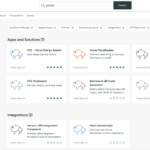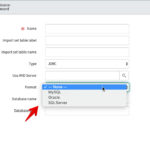I had a customer ask me today how to easily convert a Glide Record object to JSON format. They were using the JSON Web Services Plugin and wanted to send data from ServiceNow to a JSON Web Service.
I reviewed the OOB JSON class that does object encoding and found that it didn’t have a dedicated method for encoded GlideRecord objects.
I wrote a quick Script Include that inherits from the JSON class and adds a function called “encodeGr”.
Here is how you can do it:
SCRIPT INCLUDE NAME: JSONG
SCRIPT:
1 2 3 4 5 6 7 8 9 10 11 12 13 14 15 16 17 18 19 20 21 22 23 24 25 26 27 28 29 | var JSONG = Class.create(); JSONG.prototype = Object.extendsObject(JSON, { encodeGr : function(o) { var a = ["{"], b, i, v; for (i in o) { if(o.hasOwnProperty(i)) { v = o[i].toString(); switch (typeof v) { case "undefined": case "function": case "unknown": break; default: if (b) { a.push(','); } a.push(this.encode(i), ":", v === null ? "null" : this.encode(v)); b = true; } } } a.push("}"); return a.join(""); } }); |
Then to test it, you can go to your “Background Scripts” module and run the following script:
1 2 3 4 5 6 7 8 | var gr = new GlideRecord("incident"); gr.query(); gr.next(); gs.print(gr.short_description); var g = new JSONG(); var t = g.encodeGr(gr); gs.print(t); |
This should return your GlideRecord in the following format:
1 2 3 4 5 6 7 8 9 10 11 12 13 14 15 16 17 18 19 20 21 22 23 24 25 26 27 28 29 30 31 32 33 34 35 36 37 38 39 40 41 42 43 44 45 46 47 48 49 50 51 52 53 54 55 56 57 58 59 60 61 62 63 64 65 66 67 68 69 70 71 72 73 74 75 | { "assigned_to": "", "category": "inquiry", "escalation": "3", "state": "1", "location": "", "reassignment_count": "0", "time_worked": "", "order": "", "due_date": "", "number": "INC0010001", "upon_approval": "proceed", "sla_due": "2010-09-15 17:31:07", "follow_up": "", "notify": "1", "business_stc": "", "caused_by": "", "rejection_goto": "", "assignment_group": "d625dccec0a8016700a222a0f7900d06", "incident_state": "1", "opened_at": "2010-08-25 17:31:07", "wf_activity": "", "calendar_duration": "", "group_list": "", "caller_id": "", "comments": "", "priority": "4", "sys_id": "aa4d9e0bc0a8016b00c96a8605090a6d", "sys_updated_by": "system", "variables": "", "delivery_task": "", "sys_updated_on": "2011-04-14 20:50:43", "parent": "", "active": "true", "opened_by": "glide.maint", "expected_start": "", "sys_meta": "System meta data", "watch_list": "", "company": "", "upon_reject": "cancel", "work_notes": "", "sys_created_by": "glide.maint", "cmdb_ci": "", "approval_set": "", "user_input": "", "sys_created_on": "2010-08-25 17:32:00", "contact_type": "phone", "rfc": "", "approval_history": "", "activity_due": "", "severity": "3", "subcategory": "", "work_end": "", "closed_at": "", "close_notes": "", "variable_pool": "", "business_duration": "", "knowledge": "false", "approval": "not requested", "sys_mod_count": "3", "problem_id": "", "calendar_stc": "", "work_start": "", "sys_domain": "global", "correlation_id": "", "sys_class_name": "incident", "short_description": "No one told me about the crash", "impact": "3", "description": "", "correlation_display": "", "urgency": "3", "made_sla": "true", "delivery_plan": "", "closed_by": "" } |





Kenny Caldwell suggests that you name your new child class something a little different so that “JSON” is at the beginning of the class name so that it shows up with your other JSON script includes.
Some suggestions are:
* JSONG
* JSONGlide
Use your imagination! 🙂
we have JSON go for JDAD….
The real dadyy
Thanks for this great post, even after 5 years it is working like a charm. (Saved a lots of efforts from my side)
Cheers
Hi, does this work on scoped applications ? I checked with global.JSON and it won’t work. I did some analysis and found that GlideObject is passed as null, the same works on global script include( including cross scope, from private to global call). Any idea on how to make this work within the same private scope ?
I updated the code to make the properties in the JSON object alphabetical. This makes viewing the JSON object a bit easier if you have a need for that:
var JSONG = Class.create();
JSONG.prototype = Object.extendsObject(JSON, {
encodeGr : function(o) {
var a = [“{“], b, i, v, j;
var propArr = [];
for (j in o) {
if(o.hasOwnProperty(j)) {
propArr.push(j);
}
}
propArr.sort();
for (i=0; i< propArr.length; i++) {
v = o[propArr[i]].toString();
switch (typeof v) {
case "undefined":
case "function":
case "unknown":
break;
default:
if (b) {
a.push(',');
}
a.push(this.encode(propArr[i]), ":", v === null ? "null" : this.encode(v));
b = true;
}
}
a.push("}");
return a.join("");
}
});
Why not do it this way:
var gr = new GlideRecord(“incident”);
gr.query();
gr.next();
gs.print(gr.short_description);
var obj = {};
for (var i in gr) {
if (!{}.hasOwnProperty.call(obj, i)){
obj[i] = gr[i].toString();
}
}
gs.log(JSON.stringify(obj));
How about this
JSON.stringify(new XMLHelper(new GlideRecordXMLSerializer().serialize(gr)).toObject());